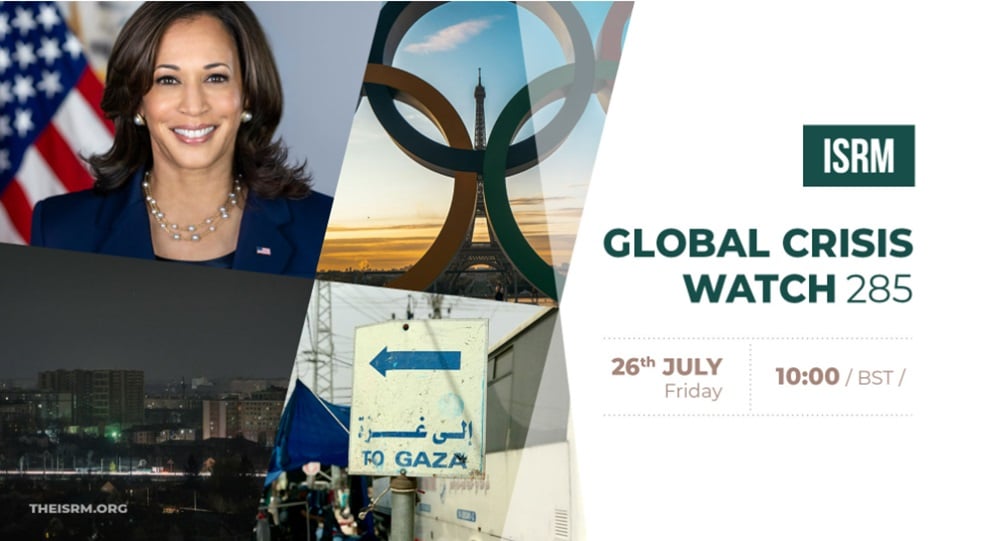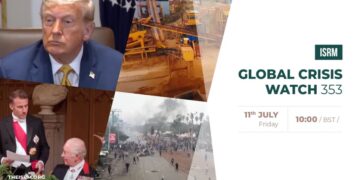The Institute of Strategic Risk Management (ISRM) is inviting security professional to its weekly Global Crisis Watch, #285, taking place tomorrow, Friday, July 26, at 10:00 BST. Topics this week will include Kamala Harris replacing Joe Biden in the U.S election race, the security measures being put in place for the upcoming Paris Olympics, Ukranian PM Zelensky looking at modalities of the end of the conflict, while the country struggles with energy supplies, as well as an update on the Israel and Hamas conflict, in which Israeli Prime Minister Benjamin Netanyahu has reversed a ceasefire concession, which could disrupt the process towards ceasefire. Read more about the key topics below. Other current topics will also be included in the agenda.
President Biden drops of out the Election and is replaced by VP Kamala Harris
US President Joe Biden has ended his re-election campaign and endorsed Vice-President Kamala Harris to succeed him as the Democratic candidate, upending the race for the White House. In a written statement on Sunday, Biden, 81, called serving as president the “greatest honour” and stated that his withdrawal was “in the best interest of my party and the country.” This announcement follows a turbulent period in US politics, marked by Biden’s shaky debate performance against Donald Trump on June 27th.
Although Biden will remain president until January, Harris, 59, expressed her gratitude for the endorsement, stating her intention to “earn and win this nomination” and to unite the country against Trump. Harris has been gaining endorsements from major figures in the Democratic Party but has yet to be officially nominated, which may occur at the Democratic National Convention in August.
Paris is securing the upcoming Olympics
Paris is implementing extensive security measures for the upcoming Olympics, including deploying 45,000 police and gendarmes and 10,000 soldiers, establishing the largest military camp in the city since World War II. The decision to host events in central Paris and along the River Seine, rather than in an Olympic park, poses unique security challenges. Fighter jets, drones and a no-fly zone will secure the skies, while AI-equipped surveillance cameras will monitor for potential threats.
The Games’ organizers face concerns about cyberattacks and criticisms from rights campaigners who worry about the long-term implications of increased surveillance on privacy and freedoms. The security apparatus includes background checks, blocking over 3,900 individuals from attending, and special scrutiny for those from Russia and Belarus due to geopolitical tensions.
Zelensky is looking at modalities of the end of the conflict, while Ukraine struggles with Energy
Ukrainian President Volodymyr Zelensky aims to end the “hot stage” of the war with Russia by the end of 2024, with support from international partners. In an interview with the BBC on July 18th,Zelensky expressed confidence in the possibility of achieving this goal through unity and the format of a peace summit. He mentioned that while a plan is being prepared, specific details remain undisclosed.
Despite Russia’s absence from the initial peace summit in Switzerland, Kyiv intends to invite a Russian representative to a follow-up conference, hoping to present a jointly developed peace plan. However, the Russian Foreign Ministry has already rejected participation in the second summit. Zelensky emphasized the importance of exerting global pressure on Russia to consider a diplomatic settlement, stating that weakening Russia on the battlefield could lead to a more favorable position for Ukraine in negotiations.
New Dynamics for Israel – Gaza ceasefire
Israeli Prime Minister Benjamin Netanyahu has reversed a significant concession in ceasefire negotiations, demanding that armed men be barred from northern Gaza during any ceasefire. Initially, Israel had agreed to allow unrestricted access to northern Gaza, but Netanyahu’s new stance could disrupt progress in hostage negotiations. This shift raises questions about Netanyahu’s commitment to Israel’s own proposal, which had become the basis for detailed negotiations. Talks resumed in Doha last Friday, with Hamas compromising on a major point by agreeing to a permanent ceasefire before signing an agreement.
To register, click here
For more ISRM news, click here






